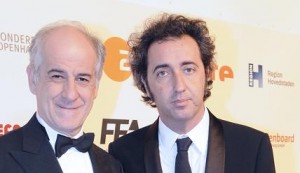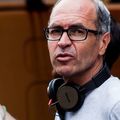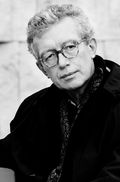A History of Italy
Interview with
Paolo Sorrentino, director, Italy
Andrea Occhipinti, producer, Italy

Paolo Sorrentino (right) with Toni Servillo at the European Film Awards 2008 in Copenhagen (Picture: EFA/Andreas Böhmig)
Nominated for EUROPEAN FILM 2008
for IL DIVO
Italy has a lot of nominations for this year’s European Film Awards - how does that feel?
Paolo Sorrentino: For me it is a great, great honour because it is the first time I am a candidate here. I think my way to make cinema is very European and I am very happy that the European Film Academy recognizes this characteristic of my movies.
What does it mean to you when you say your way to make movies is European?
PS: I hope it is European! Well, I think that my movie is in the tradition of the cinema of my country, but not only of my country, in the tradition of all of Europe. It is possible to do this movie in another European country. It is a European story.
How would you describe this European characteristic?
PS: I don’t think you can generalize - generalizing is always wrong, but having said that, [laughs] European film is very close to the audience. But, at the same time it is far from the commercial characteristic of American cinema. Sometimes I think the most important thing about European cinema is this very close bond with the audience.
Tell me about your movie - how did you get the idea to do it?
PS: For me, it is an old idea. I decided to make this film because Giulio Andreotti [Il Divo, played by Toni Servillo] is a very important person for us. Giulio Andreotti is the most important politician Italy has had in the last half century. The fascination lies in his ambiguity, and he is so psychologically complex that everyone has been intrigued by him over the years. I’ve always wanted to make a film about Andreotti, but when I started reading about him, I found myself wading through literature that was so vast and contradictory, it made my head spin. For a long time I thought that all this “material” could never be funnelled into the essential structure that a film requires.
But, you see, the psychological characteristic is very interesting for fiction. He walks through the history of Italy for 40 years, and it was a good possibility for me to talk about some tragic events of Italy, through him and with him. So, for these reasons I wanted to do the film.
How did you prepare for it?
PS. The most difficult part of the work was the research. But after I had seen the film The Queen by Stephen Frears, I understood that it was possible to do my film Il Divo. Because in The Queen you see how the director chose only a brief period in the life of this person. So I did the same. And then I started preparing all the material where the most difficult part was what to choose….
AO: ….in terms of what to put into the film and what to leave out of it.
It is a fiction film - but how close are we to the real person, his sense of humour, his cynical way of thinking, and those unforgettable one-liners?
PS: The film is very close to the character of Andreotti. He is known for his wit. He has a very huge sense of humour….
AO: Many of the lines from the film are more or less famous lines form Andreotti, true quotes. The one where he says that he knows the Vatican even better than the Pope does is taken from reality.
Did you talk to a lot of people who know him?
PS: I talked to several people who were close to him and other people who are against him. Maybe the truth lies somewhere in between…. And then I did a lot of research, studied the books, read articles from the news papers.
As I said in the beginning, the fascination lies in his ambiguity, and I understood whilst researching that the image of Andreotti as the quintessence of ambiguity has not only been projected by scholars, reporters and Italians in general, but is also one what he himself has cultivated by invariably playing on and exploiting that ambiguity.
How have the reactions to the film been in Italy? In Denmark I’ve read articles where some journalists reported from Cannes and some felt they got manipulated by the film whilst others saw it as the opposite.
AO: The audience felt manipulated or the critics?
The critics…
PS: [Laughs] But that is the soul of Andreotti! Well, the reaction in Italy was very good - both from the audience and the critics.
AO: Since he is such a known person - the press wrote a lot on the movie before, during and after the filming. It was really huge and there were a lot of expectations. He has been untouchable for such a long time. Somehow he was not so happy that this film was made. [laughs]
Looking at it from the outside, you get the impression that Italian cinema really tries to tell the truth about what is going on in the country. I am thinking of your film and also of Gomorra - what is going on? Or is it a coincidence?
PS: I think in Italy there is often a problem with the truth. We often live with suspicions or we are often under suspect. We cannot know the truth of the political life and the social life because we don’t believe what they say. And we do not believe the television. I think the cinema is one of the things you cannot control.
AO: So, in that sense you can say that we try to reveal what is going on in Italy and we want to talk about the truth. And I think for that same reason so many people bought the book by Roberto Saviano, the book behind the film Gomorra. Because it was something new, it told us something form behind the scenes, something we and the rest of Europe didn’t know.
PS: And maybe for these reasons the films are so successful.
Did you ever talk to Andreotti?
PS: I talked to him twice before making the film. I had many questions for him and I felt it was important for me to know him.
AO: Because he is so well-known and there is so much caricature of him.
PS: He didn’t take me seriously at all. He was sure that it was not a real possibility that I would make the movie. And he didn’t give it great importance whatsoever.
And afterwards, have you heard from him?
PS: Yes, afterwards he was very angry. And it is not very normal for us to see someone who reacts so strongly. He is very controlling, very political. And he threatened to leave the screening….
AO: But when he talked to the press afterwards he was very nonchalant, he said he had seen the movie only partially [laughs] although I saw him sitting there during the entire movie. But it’s no surprise - he knows how to play the public game.
***
Interviewed by Frederikke Lett in Copenhagen, December 2008









